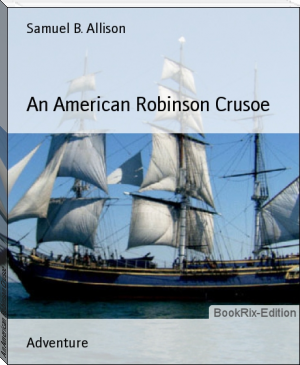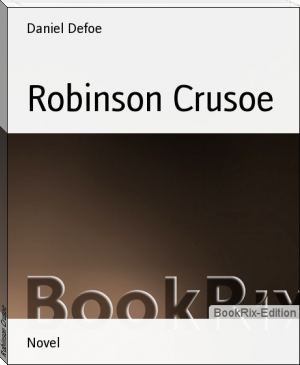An American Robinson Crusoe - Daniel Defoe (reading cloud ebooks .TXT) 📗

- Author: Daniel Defoe
- Performer: -
Book online «An American Robinson Crusoe - Daniel Defoe (reading cloud ebooks .TXT) 📗». Author Daniel Defoe
He had completed his hedge with the exception of a small hole that must serve for a door. But the door must not be seen from without.
As Robinson thought, it came to him that there was still place for two thistles on the outside. He could easily get in, but the entrance was difficult to find from the outside.
Robinson looked on his hedge from without. It was not yet thick enough. For this reason he planted small thistles between the larger ones. With the digging them out and transplanting them he was a whole week longer.
Finally, the hedge and the yard were ready. Now Robinson could rest without fear and sleep in his cave, and could have his goat near him all the time. It delighted him greatly. It ran after him continually like a dog. When he came back from an absence, it bleated for joy and ran to meet him as soon as he got inside the hedge. Robinson felt that he was not entirely alone. He had now a living being near him.
XX ROBINSON GETS READY FOR WINTERThere was one thing that troubled Robinson greatly. “What will become of me when the winter comes? I will have no fire to warm me. I have no clothing to protect me from the cold, and where shall I find food when snow and ice cover all the ground and when the trees are bare and the spring is frozen? It will be cold then in my cave; what shall I do? It is cold and rainy already. I believe this is harvest time and winter will soon be here. Winter and no stove, no winter clothing, no winter store of food and no winter dwelling. What shall I do?”
He considered again the project of making fire. He again sought out two pieces of wood and sat down and rubbed them together. The sweat rolled down his face. When the wood began to get warm, his hand would become tired, and he would have to stop. When he began again the wood was cold. He worked for an hour or two, then he laid the wood aside and said, “I don’t believe I can do it I must do the next best thing. I can at least get warm clothing to protect me from the rain and snow.” He looked down at his worn, thin clothing, his trousers, his shirt, his jacket; they had become so thin and worn that they were threadbare.
“I will take the skins of the hares which I have shot and will make me something,” he thought. He washed and cleaned them, but he needed a knife and he set about making one. He split one end of a tough piece of wood, thrust his stone blade in it and wound it with cocoa fibre. His stone knife now had a handle. He could now cut the skins quite well. But what should he do for needle and thread? Maybe the vines would do. “But they are hardly strong enough,” he thought. He pulled the sinews from the bones of the rabbit and found them hard. Maybe he could use them. He found fish skeletons on the seashore and bored a hole in the end of the small, sharp rib bones. Then he threaded his bone needle with the rabbit sinews and attempted to sew, but it would not go. His needle broke. The skin was too hard. He bored holes in the edge of the pieces of skin and sewed through the holes. This went very well.
He sewed the skins together with the hair side inward, made himself a jacket, a pair of trousers, a hat, and finally covered his parasol with rabbit skin, for the rain had already dripped through the leaves of it. All went well, only the trousers did not fit. He loosened them and puckered them to no purpose. “Anyway,” he thought, “I am now well protected from the cold, when it does come.”
[Illustration: ROBINSON IN HIS NEW SUIT]
XXIHOW ROBINSON LAYS UP A STORE OF FOOD
Now for the food. Could Robinson preserve the meat? He had often heard his mother tell about preserving meat in salt. He had even eaten salt meat, pickled meat. But where could he get salt?
One day when the wind blew hard the water was driven upon the shore and filled a little hollow. After a few days the ground glistened white as snow where the water had been. Was it snow? Robinson took it in his hands and put it in his mouth. It was salt. The sun had evaporated the water in the hollow—had vaporized it—and the air had drunk it up. What was left behind? Salt. Now he could get salt as long as he needed it.
He took cocoanut shells and strewed salt in them. Then he cut the rabbit meat in thin strips, rubbed them with salt, and laid them one on the other in the salt in the shells. He covered it over with a layer of salt. He put over each shell the half of a larger one and weighted it down with stones. After a period of fourteen days he found the meat quite red. It had pickled.
But he did not stop here. He gathered and stored in his cellar cocoanuts and corn in such quantities that he would be supplied for a whole winter. It seemed best to catch a number of rabbits, build a house for them and keep them. Then he could kill one occasionally and have fresh meat. Then it came to him that goats would be much better, for they would give milk. He determined immediately to have a herd of goats. He made a string or lasso out of cocoa fibre.
Then he went out, slipped up quietly to a herd of goats and threw the lasso over one. But the lasso slipped from the horns and the goat ran away. The next day he had better luck. He threw the lasso, drew it tight and the goat was captured. He brought it home. He rejoiced when he saw that it gave milk. He was happy when he got his first cocoanut shell full of sweet rich milk. His goat herd grew. He soon had five goats. He had no more room in his yard. He could not provide food enough. He must let them out. He must make another hedge around his yard so that the goats could get food and yet be kept from going away. He got stakes from the woods and gathered them before his cave. He sharpened them and began to drive them in the earth. But it rained more and more each day. He was wet through as he worked. He had finally to stop work, for the rain was too heavy.
XXIIROBINSON’S DIARY
Robinson was much disturbed because he had no means of keeping a record of things as they happened from day to day. He had his calendar, it is true. He would not lose track of the time. But he wished for some way to write down his thoughts and what happened. So he kept up keen search for anything that would serve him for this purpose.
Every time he journeyed about the island he kept careful watch for something that he might write upon. He thought of the leaves of the palm tree, the white under surface of the shelf fungus. But these he found would not do. He tried many kinds of bark and leaves. There was a kind of tall reed or grass growing in the marshes whose rind seemed good when dried. He examined the inner bark of many trees. He at last found that the inner bark of a tree which resembled our elm tree worked best. He would cut through the bark with his stone knife around the tree. At about one foot from this he would cut another ring. He then would cut through the bark lengthwise from one circular cut to the other. He could then peel off the section easily. While it was yet full of sap he would separate the soft, tough, thin inner layer of the bark. This usually came off in sheets without a break. When these sheets of bark were stretched and dried they could be used very nicely instead of paper.
Robinson next searched for something that would serve him as ink, and this was much easier to find than paper. He had noticed many kinds of galls of many different colors growing on trees. He did not know what they were, or how they grew, but he had learned in his father’s store that ink was often made from galls gathered from trees. “Anyway,” he thought, “I can get ink from the cuttle-fish.” He had watched this animal get away from its enemies by sending out a cloud of purplish fluid, in which to hide as it darted away. He had learned also that indigo is made from the leaves of a plant. He had noticed a plant growing in the open places in the forest whose leaves turned black when dried.
Robinson gathered a quantity of gall-nuts and soaked them in water. To the black fluid thus obtained he added a little rice water to make it flow well, and this served very well as an ink. He kept his ink in a cup made from a cocoanut shell.
He was not long in getting a pen, though the lack of a good sharp knife made it hard to make a good one. In going about he had gathered a quantity of large feathers. He saved these for the time when he should have his paper and ink ready. Now, he cut away a quill to a point and split it up a little way. He was now supplied with writing materials. “Is it not wonderful,” he thought, “how all our wants are filled? We have only to want a thing badly enough and it comes.”
Robinson began at once to write down the date for each day and the main thing he did or that happened on it. He called this his diary. He had now a better way of keeping time than on his tree calendar. He did not need it any more.
You have no doubt wondered how Robinson could work in his cave, especially at night without a light. The truth is, it was a great source of discomfort to him. At sunset he was in total darkness in his cave. During the day light enough streamed in from the open doorway. To be alone in total darkness is not pleasant. “If I only had fire!” he said again and again.
He watched the many large beetles and fireflies flash their light in the dark of the evening as he sat in front of his shelter. The thought came to him that if he only had some way of keeping together a number of them, they would serve very well for a candle in his cave at night. How he longed for a glass bottle such as he had so often wantonly broken when at home! Back of his shelter there was a hill where the rock layers jutted out. He had noticed here several times the thin transparent rock that he had seen in his father’s store. It is called isinglass.
“I will make a living lantern,” he said aloud in his eagerness.
He soon had a suitable piece pried loose. He





Comments (0)